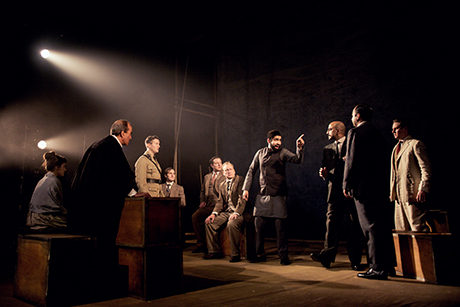
A gulf inevitably exists between ruler and ruled; some degree of compliance and submission to the will of the former by the latter must permeate the relationship. Add to this dynamic the tensions born of race, religion and culture, to say nothing of that between subject and imperial peoples and the possibility of friendships across the divide takes on a bleak aspect. In Forster’s mind the way through is by cutting the Gordian knot with mere human qualities, those things we share despite the things that keep us apart.
Asif Khan, in a balanced and nuanced portrayal of Aziz, brings out the ambiguities of the character: a conformist, over-eager to please his masters whilst irritated with the necessity to do so. He is a man pushed into subservience by circumstance who ultimately ends up suffering as a result of crossing the line into the world of his rulers.
Liz Crowther’s Mrs Moore has a nobility of spirit suggested in part by a poise and authority she brings to the role. An interested traveller in a world neither of her making or choosing, she is perhaps the moral conscience of the imperialists and as such is humored rather than obeyed. In extremesis she is either ridiculed or ignored; her fleeing from the caves in a state of panic and confusion being possibly an act of prescience over events she cannot face. Her maxim of being nice to people, whilst no cure for imperialism is nonetheless one of your five a day to ward off a descent into the mere automatism of Ronny, who is not, as he sees it, there to be nice, but to administrate the subject peoples. Hardly surprising then that his is an unsympathetic character, played with brisk imperial conviction by Edward Killingback, who induces an uncomfortable squirming in our modern sensibilities, no less than the blatantly racist, Callendar (Matthew Douglas). Both are capable of little more than the vapid nostrums of died-in-the-wool imperialists.
Noticeably it is the two central women who exhibit a more congenial backbone. Adela (Phoebe Pryce) no less that Mrs. Moore, possesses those qualities we would most like to acknowledge. Like Aziz she is not entirely her own person, but subject to the conformities of her age and milieu. There is no silliness in this performance so no shock when she has the courage to admit her mistake.
In bringing one of the undoubtedly great works of twentieth century literature to the stage some compromise is inevitable. In Simon Dormandy’s adaption the trick is very nearly brought off. Some clever compressing, such as the arrest of Aziz immediately after the ‘incident’ outside the caves, is dramatically astute. The ending on the other hand, that is after the dramatic turnaround of Adela and the fate of Aziz, becomes a kind of coda or epilogue, which is fine as literature, but as a dramatic device is something of an anticlimax.
Fielding (Richard Goulding), like Mrs Moore, is a benign observer of events whose own humanity is affronted by the world of the imperialists. Ostracized by his own people for making a similar journey to Aziz in crossing a racial divide, his astute judgment of character is borne out by events. It is his desire to circumvent the perverting demands of tribe in his relationships that stand as the central theme of the work.
The set is a stark minimalist one of pillar-like drapes with the only hint of ‘exotic otherness’ suggested by the incidental music of Kuljt Bhamra, which weaves its way liltingly through the play, punctuated by the brooding motif of the Marabar Caves.
Imperialism and racism poisons those human capacities that can bring us together, but sadly they are not the only poisons that tear humanity apart. Whatever may have happened in the intervening century the themes of this play remain as relevant today as they were during the height of the age of empires.
This is an intelligent and well crafted production by a peerless company that prods away at question that still demand answers which are arguable even more urgent in our contracting world. ★★★★☆ Graham Wyles 31st January 2018

